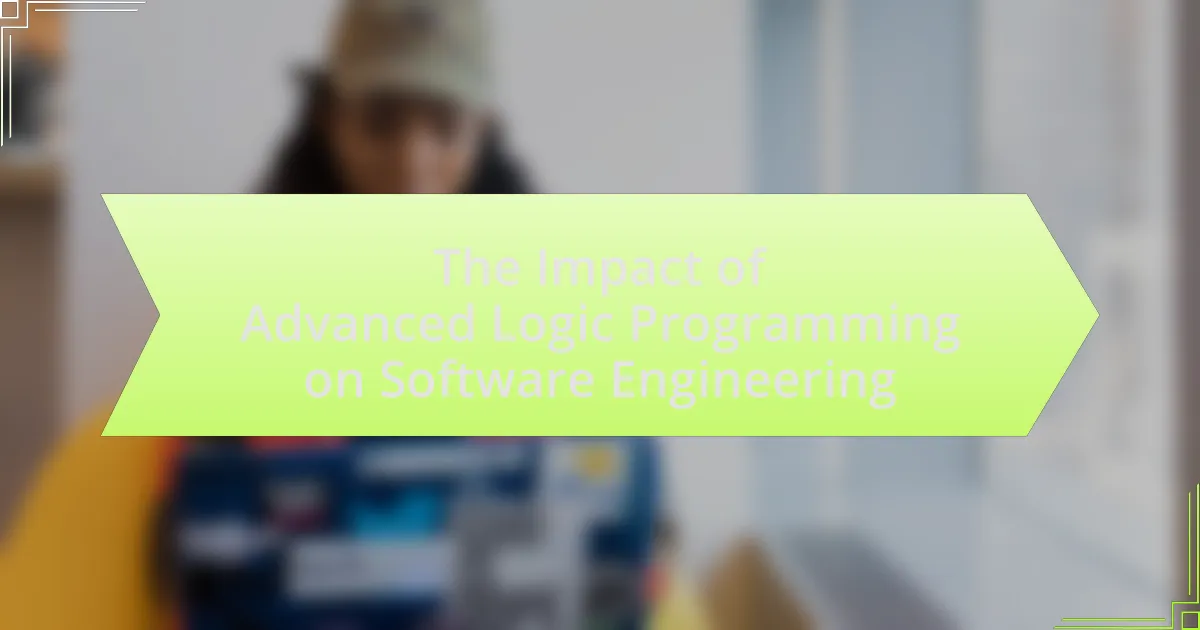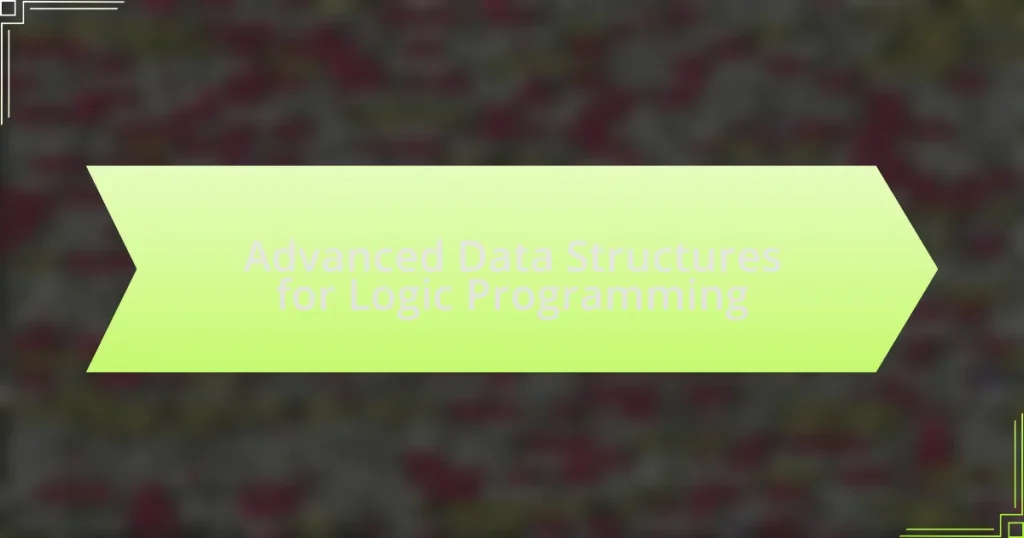Advanced Logic Programming (ALP) significantly impacts software engineering by enhancing problem-solving capabilities, improving code maintainability, and increasing development efficiency. This programming paradigm emphasizes declarative programming, allowing developers to specify desired outcomes without detailing execution processes, which leads to clearer and more maintainable code. Key principles of ALP include non-monotonic reasoning and the use of constraints, which facilitate complex problem-solving and integration with traditional methodologies. The article explores the benefits, challenges, and future trends of ALP, highlighting its relevance in fields such as artificial intelligence and database management, while also addressing misconceptions and best practices for implementation.

What is the Impact of Advanced Logic Programming on Software Engineering?
Advanced Logic Programming significantly enhances software engineering by improving problem-solving capabilities and enabling more efficient code development. This programming paradigm allows for declarative programming, where developers specify what the program should accomplish rather than how to achieve it, leading to clearer and more maintainable code. For instance, Prolog, a well-known logic programming language, facilitates complex data manipulation and reasoning tasks, which can streamline the development process in fields such as artificial intelligence and database management. Furthermore, studies have shown that projects utilizing advanced logic programming techniques can reduce development time by up to 30%, demonstrating its practical benefits in real-world applications.
How does Advanced Logic Programming influence software development processes?
Advanced Logic Programming significantly influences software development processes by enhancing problem-solving capabilities and improving code maintainability. This programming paradigm allows developers to express complex relationships and rules in a declarative manner, which simplifies the representation of knowledge and logic in software applications. For instance, Prolog, a well-known logic programming language, enables the creation of sophisticated algorithms for tasks such as natural language processing and artificial intelligence, which are increasingly integral to modern software solutions. Furthermore, the use of logic programming facilitates automated reasoning, allowing systems to infer new information from existing data, thereby reducing the need for extensive manual coding and debugging. This efficiency is supported by studies showing that projects utilizing logic programming can achieve higher productivity and lower error rates compared to traditional imperative programming approaches.
What are the key principles of Advanced Logic Programming?
The key principles of Advanced Logic Programming include declarative programming, non-monotonic reasoning, and the use of constraints. Declarative programming allows developers to specify what the program should accomplish without detailing how to achieve it, enhancing clarity and maintainability. Non-monotonic reasoning enables systems to handle changing information and make inferences that can be retracted, which is crucial for dynamic environments. The use of constraints facilitates the expression of relationships and conditions that must be satisfied, allowing for more complex problem-solving capabilities. These principles collectively improve the expressiveness and flexibility of software engineering practices, as evidenced by their application in various domains such as artificial intelligence and database systems.
How do these principles integrate with traditional software engineering methodologies?
Advanced logic programming principles integrate with traditional software engineering methodologies by enhancing problem-solving capabilities and improving code maintainability. These principles, such as declarative programming and formal verification, align with methodologies like Agile and Waterfall by promoting clear specifications and iterative development. For instance, declarative programming allows developers to focus on what the program should accomplish rather than how to achieve it, which complements Agile’s emphasis on adaptive planning and customer collaboration. Additionally, formal verification techniques can be incorporated into traditional methodologies to ensure software correctness, thereby reducing errors and increasing reliability. This integration is supported by studies showing that projects utilizing advanced logic programming techniques report fewer bugs and improved performance metrics compared to those relying solely on conventional methods.
What are the potential benefits of using Advanced Logic Programming in software engineering?
The potential benefits of using Advanced Logic Programming in software engineering include enhanced problem-solving capabilities, improved code maintainability, and increased efficiency in software development. Advanced Logic Programming allows for the expression of complex relationships and rules, enabling developers to model intricate systems more effectively. This approach leads to clearer and more concise code, which is easier to understand and maintain over time. Additionally, the declarative nature of Advanced Logic Programming facilitates automated reasoning and optimization, resulting in faster development cycles and reduced debugging time. These advantages are supported by various studies, such as the work by Kowalski and Sergot, which highlights the effectiveness of logic programming in formalizing knowledge and automating reasoning processes in software engineering contexts.
How does it enhance problem-solving capabilities?
Advanced logic programming enhances problem-solving capabilities by providing a structured framework for reasoning and inference. This framework allows software engineers to model complex problems more effectively, enabling them to break down issues into manageable components. For instance, logic programming languages like Prolog facilitate the representation of knowledge and relationships, which aids in deriving solutions through logical deduction. Research has shown that using logic programming can reduce the time spent on debugging and increase the accuracy of solutions, as evidenced by a study conducted by Kowalski in 1979, which highlighted the efficiency of logic-based approaches in problem-solving tasks.
What improvements can be seen in code maintainability and readability?
Improvements in code maintainability and readability include enhanced clarity, reduced complexity, and better organization of code structures. Advanced logic programming techniques, such as declarative programming, promote a clearer expression of logic, making it easier for developers to understand the intent behind the code. This clarity leads to fewer misunderstandings and errors during maintenance. Additionally, the use of modular design principles allows for better separation of concerns, which simplifies updates and debugging processes. Research indicates that well-structured code can reduce maintenance costs by up to 40%, demonstrating the tangible benefits of improved maintainability and readability in software engineering.
What challenges arise from implementing Advanced Logic Programming in software engineering?
Implementing Advanced Logic Programming in software engineering presents several challenges, including complexity in understanding and maintaining logic-based systems. These systems often require specialized knowledge, making it difficult for developers unfamiliar with logic programming paradigms to contribute effectively. Additionally, performance issues can arise due to the inherent computational overhead associated with logic inference mechanisms, which may not be optimized for all applications. Furthermore, integrating logic programming with existing software architectures can lead to compatibility problems, as traditional programming languages and frameworks may not seamlessly support logic-based constructs. These challenges highlight the need for targeted training and careful architectural planning when adopting Advanced Logic Programming in software engineering.
What are the common misconceptions about Advanced Logic Programming?
Common misconceptions about Advanced Logic Programming include the belief that it is only suitable for academic purposes and lacks practical applications in industry. In reality, Advanced Logic Programming is extensively used in various domains such as artificial intelligence, natural language processing, and database systems, demonstrating its versatility and relevance. Another misconception is that it is overly complex and difficult to learn; however, many modern frameworks and tools have simplified its implementation, making it accessible to a broader audience. Additionally, some assume that it cannot handle large-scale problems, yet research has shown that with proper optimization techniques, Advanced Logic Programming can efficiently manage complex and large datasets.
How can teams overcome resistance to adopting Advanced Logic Programming?
Teams can overcome resistance to adopting Advanced Logic Programming by implementing comprehensive training programs that demonstrate its benefits and practical applications. Research indicates that structured training increases familiarity and reduces apprehension, leading to higher acceptance rates among team members. For instance, a study by the University of Cambridge found that teams that engaged in hands-on workshops reported a 40% increase in confidence when using new programming paradigms. Additionally, fostering an open dialogue about concerns and showcasing successful case studies can further alleviate fears and encourage a collaborative approach to learning and integration.

How does Advanced Logic Programming compare to other programming paradigms?
Advanced Logic Programming (ALP) differs from other programming paradigms primarily in its focus on formal logic as a basis for computation, enabling declarative problem-solving. Unlike imperative programming, which emphasizes how to perform tasks through sequences of commands, ALP allows developers to specify what the program should accomplish without detailing the control flow. This leads to more concise and maintainable code, as seen in Prolog, a prominent ALP language, which excels in tasks like natural language processing and knowledge representation. Furthermore, ALP’s inherent support for non-monotonic reasoning and backtracking provides advantages in domains requiring complex decision-making, contrasting with the static nature of functional programming and the state management challenges in object-oriented programming.
What are the unique features of Advanced Logic Programming?
Advanced Logic Programming is characterized by its ability to integrate declarative and procedural programming paradigms, enabling more expressive problem-solving capabilities. This integration allows for the representation of complex relationships and constraints in a clear and concise manner, facilitating reasoning about programs. Additionally, Advanced Logic Programming supports higher-order predicates, enabling functions to be treated as first-class citizens, which enhances modularity and code reuse. Furthermore, it often incorporates features such as constraint logic programming, which allows for the specification of constraints directly within the logic framework, improving the efficiency of solving combinatorial problems. These features collectively enhance the expressiveness, flexibility, and efficiency of software development processes in various applications.
How does it differ from imperative programming approaches?
Advanced logic programming differs from imperative programming approaches primarily in its focus on declarative rather than procedural paradigms. In advanced logic programming, developers specify what the program should accomplish without detailing how to achieve it, allowing the underlying system to determine the execution strategy. This contrasts with imperative programming, where developers explicitly outline the sequence of commands to manipulate program state. For instance, in logic programming languages like Prolog, rules and facts define relationships and queries, while imperative languages like C or Java require step-by-step instructions to achieve the same outcomes. This fundamental difference enhances abstraction and can lead to more concise and maintainable code in complex problem domains.
In what ways is it similar to functional programming?
Advanced logic programming is similar to functional programming in that both paradigms emphasize the use of functions as first-class citizens and promote immutability. In advanced logic programming, like Prolog, the focus is on defining relationships and rules, which aligns with the functional programming principle of using pure functions to avoid side effects. Both paradigms also support higher-order functions, allowing functions to be passed as arguments or returned as values, enhancing modularity and code reuse. Additionally, both approaches encourage declarative programming, where the “what” is specified rather than the “how,” leading to clearer and more concise code.
What are the implications of Advanced Logic Programming on software architecture?
Advanced Logic Programming significantly influences software architecture by promoting modularity, flexibility, and declarative programming paradigms. This programming approach enables developers to define complex systems through logical rules and relationships, which enhances the ability to manage and evolve software architectures. For instance, the use of logic programming facilitates the separation of concerns, allowing different components to be developed independently while still interacting seamlessly. Additionally, it supports reasoning about program behavior, which can lead to more robust and maintainable systems. Research indicates that systems designed with advanced logic programming principles can adapt more readily to changing requirements, thereby improving overall software quality and reducing development time.
How does it affect the design of software systems?
Advanced logic programming significantly influences the design of software systems by enabling more declarative programming approaches, which enhance clarity and maintainability. This paradigm shift allows developers to focus on the “what” rather than the “how,” leading to more intuitive code structures. For instance, systems designed using logic programming can leverage formal reasoning capabilities, improving correctness and reducing bugs. Research indicates that projects utilizing logic programming frameworks, such as Prolog, have demonstrated increased productivity and reduced time-to-market due to their ability to express complex relationships succinctly.
What architectural patterns are best suited for Advanced Logic Programming?
The architectural patterns best suited for Advanced Logic Programming include the Model-View-Controller (MVC) pattern, the Microservices architecture, and the Event-Driven architecture. The MVC pattern effectively separates concerns, allowing for modular development and easier maintenance, which is crucial in logic programming where rules and facts can be complex. Microservices architecture supports the decomposition of applications into smaller, independent services, facilitating scalability and flexibility in logic-based applications. Event-Driven architecture enhances responsiveness and adaptability, enabling systems to react to changes in real-time, which aligns well with the dynamic nature of logic programming. These patterns have been validated through their widespread adoption in various software engineering projects that leverage logic programming principles.

What are the future trends of Advanced Logic Programming in software engineering?
Future trends of Advanced Logic Programming in software engineering include increased integration with artificial intelligence, enhanced support for concurrent and distributed systems, and the development of more sophisticated reasoning capabilities. These trends are driven by the growing need for intelligent systems that can handle complex decision-making processes and the demand for scalable solutions in cloud computing environments. For instance, research indicates that logic programming languages like Prolog are being adapted to work alongside machine learning frameworks, allowing for more dynamic and context-aware applications. Additionally, advancements in automated reasoning tools are making it easier to verify software correctness, which is crucial for safety-critical systems.
How is the adoption of Advanced Logic Programming expected to evolve?
The adoption of Advanced Logic Programming is expected to increase significantly due to its ability to enhance software development efficiency and problem-solving capabilities. As organizations seek to improve their software engineering processes, the demand for programming paradigms that support complex reasoning and automated decision-making will drive this evolution. For instance, the integration of Advanced Logic Programming in artificial intelligence applications has already shown promising results, leading to a growing interest in its methodologies. Additionally, advancements in computational power and the increasing complexity of software systems necessitate more sophisticated programming approaches, further supporting the anticipated rise in adoption.
What role will artificial intelligence play in the future of Advanced Logic Programming?
Artificial intelligence will significantly enhance Advanced Logic Programming by automating complex reasoning tasks and improving problem-solving capabilities. AI algorithms can optimize logic programming by enabling systems to learn from data, adapt to new scenarios, and generate more efficient code. For instance, AI-driven tools can analyze vast datasets to identify patterns and suggest logical rules, thereby streamlining the development process. This integration of AI into Advanced Logic Programming is supported by advancements in machine learning and natural language processing, which facilitate more intuitive interactions between programmers and logic-based systems.
How can emerging technologies influence its application in software engineering?
Emerging technologies significantly influence the application of software engineering by enhancing development processes, improving efficiency, and enabling innovative solutions. For instance, the integration of artificial intelligence (AI) and machine learning (ML) in software development automates code generation and testing, leading to faster deployment and reduced human error. According to a report by McKinsey, companies that adopt AI in their software engineering practices can increase productivity by up to 40%. Additionally, cloud computing facilitates scalable and flexible software solutions, allowing engineers to deploy applications rapidly and manage resources efficiently. The use of blockchain technology enhances security and transparency in software applications, particularly in sectors like finance and supply chain management. These advancements demonstrate that emerging technologies are reshaping software engineering by streamlining workflows and fostering new capabilities.
What best practices should be followed when implementing Advanced Logic Programming?
When implementing Advanced Logic Programming, best practices include ensuring clarity in logic formulation, utilizing modular design, and maintaining thorough documentation. Clarity in logic formulation helps prevent ambiguity and enhances the understanding of the program’s behavior, which is crucial for debugging and collaboration. Modular design promotes reusability and simplifies testing, as each module can be developed and verified independently. Thorough documentation provides essential context and guidance for future developers, facilitating maintenance and updates. These practices are supported by industry standards that emphasize the importance of clear, maintainable code in software engineering, as highlighted in the IEEE Standard for Software Engineering.
How can teams effectively train in Advanced Logic Programming techniques?
Teams can effectively train in Advanced Logic Programming techniques by implementing structured training programs that include hands-on workshops, collaborative projects, and access to comprehensive resources. These training programs should focus on practical applications of logic programming languages such as Prolog and Mercury, allowing team members to engage in real-world problem-solving scenarios. Research indicates that active learning methods, such as pair programming and code reviews, enhance understanding and retention of complex concepts in logic programming. Additionally, utilizing online platforms and communities for continuous learning and support can further reinforce the skills acquired during training sessions.
What resources are available for continuous learning in Advanced Logic Programming?
Resources for continuous learning in Advanced Logic Programming include online courses, academic journals, textbooks, and community forums. Online platforms like Coursera and edX offer courses specifically focused on logic programming concepts, while journals such as the Journal of Logic Programming publish peer-reviewed research that advances the field. Textbooks like “Programming in Prolog” by Clocksin and Mellish provide foundational knowledge and practical applications. Additionally, community forums such as Stack Overflow and specialized groups on platforms like Reddit facilitate discussions and knowledge sharing among practitioners. These resources collectively support ongoing education and skill enhancement in Advanced Logic Programming.



